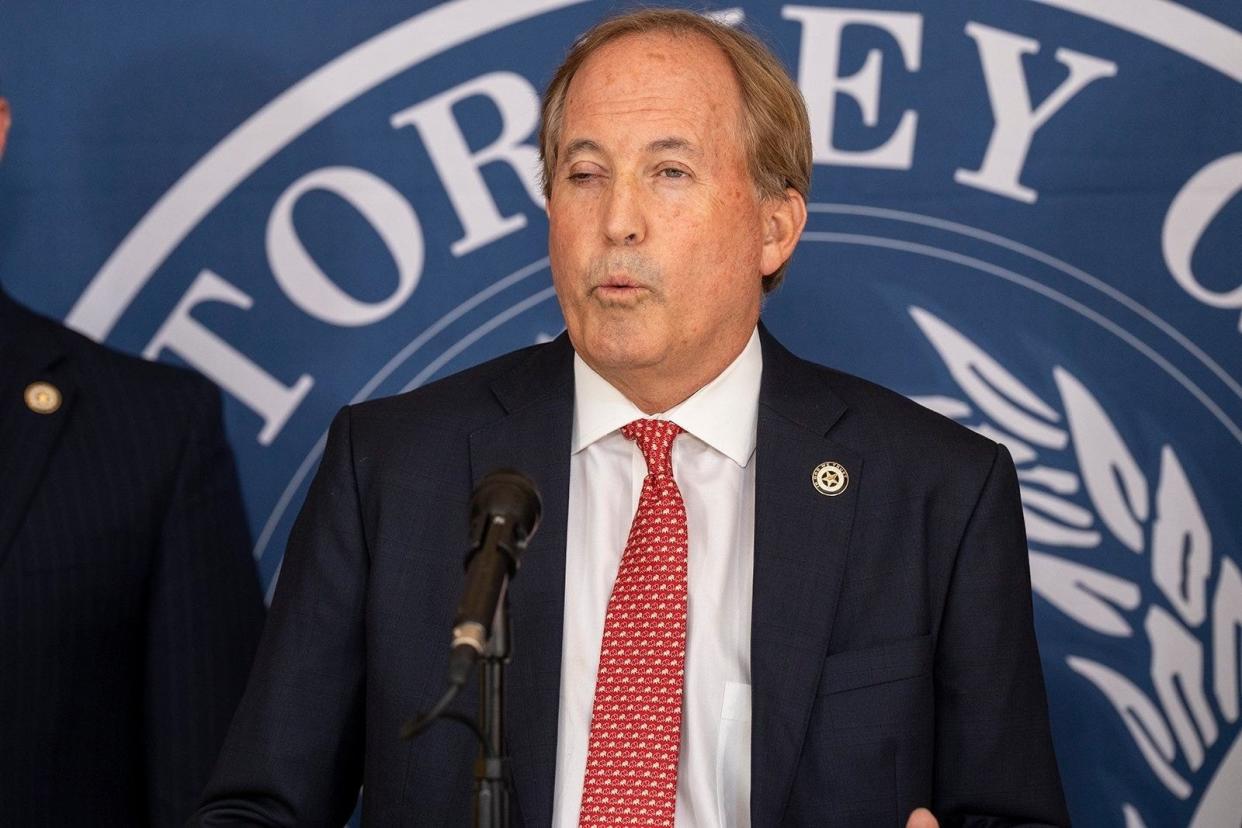Texas AG Ken Paxton's dangerous plan to expand his reach into local government | Editorial

- Oops!Something went wrong.Please try again later.
Dusting off a 39-year-old Texas code, Attorney General Ken Paxton has proposed a rule that stretches state government reach – to a stunning degree — onto the turf of district and county attorneys. The rule, which concluded a 30-day comment period last week, at first might sound harmless. Texas allows the Attorney General to require reports from district and county attorneys about criminal matters that are in the state’s interest. Paxton’s new interpretation of this code, as his office put it in a news release, is meant to boost transparency and accountability. Who can argue with that?
In fact, Paxton’s plan disguises an expansion of government power that is almost dizzying in its impact.
Under the proposed rule, district attorneys and county attorneys in counties with 250,000 people or more must submit entire case files, some with sensitive and confidential data, for an array of cases. Among these are cases involving indictment decisions about police officers, poll workers, and individuals claiming self-defense.
Paxton also gives bungee-level elasticity to the phrase “violent crime.” Under the new rule, the definition of violent crime is extended – but is not limited – to nonviolent offenses such as burglary, theft and automobile theft. “It’s a grotesque redefinition of violent crime to include nonviolent crime. Theft is associated with young people and the unhoused. It’s what you arrest kids for on the corner to teach them a lesson,” Kathy Mitchell, a senior advisor to the nonprofit Equity Action, told the editorial board. Counting these offenses as violent crimes, Mitchell said, will make for eye-popping statistics – which Paxton then can handily blame on DAs.
Related: AG Paxton’s proposal may bolster state Republican efforts to rein in Democratic DAs
Some parts of the rule are so precise they seem tailored to specific events. For example, the mandate to hand over all files related to poll workers may be a response to Paxton’s unsuccessful investigations of poll workers. There’s also a requirement for files from all cases for which the governor has publicly considered a pardon – apparently a reference to Daniel Perry, convicted in 2023 for murdering a Black Lives Matter protester. Gov. Greg Abbott pledged to pardon him.
But the most concerning part of Paxton’s rule is how unspecific it is. Redefining crime and demanding huge data chunks are not ends in themselves. They are tentacles that can grow, reaching deep into Texas daily life.
Prosecutors like Travis DA Jose Garza could be the first targets
The first targets will be big-city prosecutors. Paxton and fellow Republicans have been blunt about their disdain for these elected officials, with Travis County District Attorney José Garza squarely in their sights. Defying GOP policy, Garza ran in 2020 with a platform including marijuana decriminalization, and pledged not to prosecute abortion-related crimes after Roe v. Wade was overturned.
But Paxton's rule will create other victims as well: the voters that elected these prosecutors to enact their communal priorities or sit on grand juries. These heavily Democratic areas chose officials who would focus on crimes they really worry about –murder, assault, sexual violence.
In a state where big government once was detested, Paxton’s new rule is head-spinning. It’s also dangerous – considering where he might intrude next. Could abortion one day be classified as a violent crime? Will rape survivors report these crimes if their medical files will now circulate in state government?
A potential for Ken Paxton to expand his 'pet partisan projects'
“Ken Paxton’s proposed administrative rule for prosecutors grossly expands any concept of “violent crime,” allowing him to later include his pet partisan projects – attacks on the families of trans kids, migrants, election workers or doctors – at the expense of actual crime victims and the justice system itself,” wrote a coalition of legal activists that includes Equity Action, The Texas Civil Rights Project, Austin Community Law Center and AVOW.
In principle, Paxton has something right. Texas law enforcement should be more transparent. Gathering more data – and sharing it – could answer key questions that could modernize our legal system.
There is currently no strong database, for example, that tracks how certain crimes are prosecuted from county to county. What can we learn about charging disparities based on gender, disability, and economic status? What conditions of drug treatment may push some offenders to choose jail time instead?
Pointed questions, it turns out, could also slow Paxton’s push to impose his legal agenda. According to state procedure, his office must hold a hearing and respond to substantive comments. For the sake of transparency, Paxton should publicize this hearing far and wide. In the name of independence, Texans deserve the chance to stand up to an ever-encroaching state government.
Editor's note: This editorial has been updated to remove robbery from a list of nonviolent crimes.
This article originally appeared on Austin 360: Texas AG Ken Paxton's dangerous plan to expand his reach | Editorial

